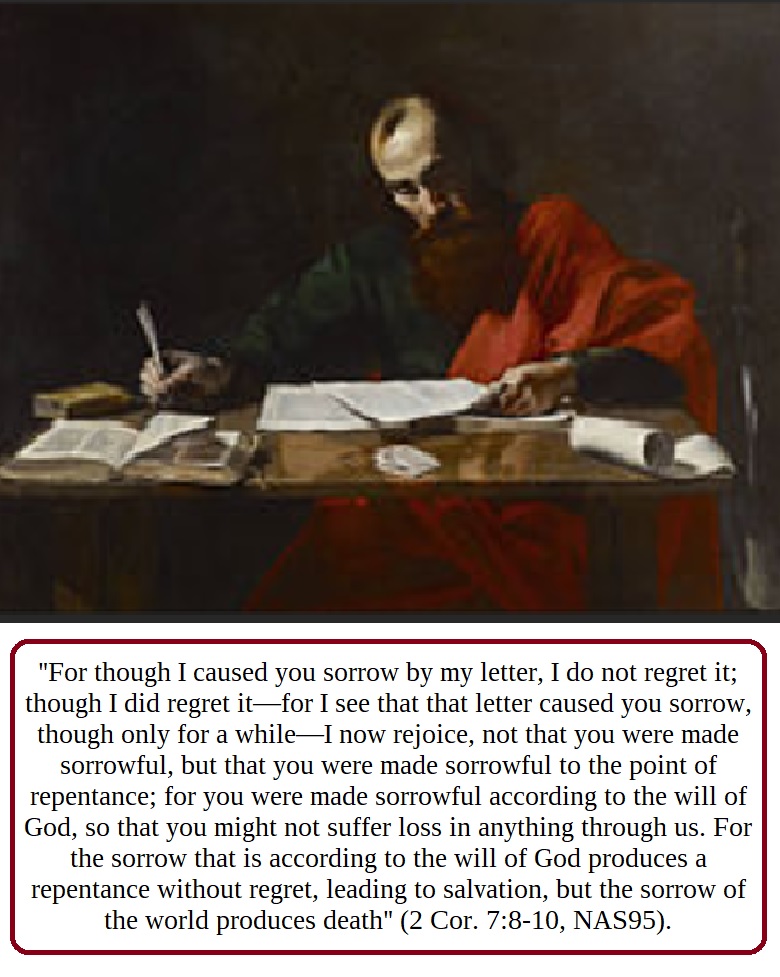“Go therefore and make disciples of all the nations…teaching them to observe all that I commanded you; and lo, I am with you always, even to the end of the age” (Matthew 28:19-20, NASB).
——————–
Contents
1) Agreement in Meaning Despite Differences in Terms (Steve Wallace)
2) The Holy Spirit’s Role in Conversion (Bryan Gibson)
——————–

-1-
Agreement in Meaning Despite Differences in Terms
Steve Wallace
The gospel of John uses different names for the same individual or beings. Simon was called “Cephas,” which is by interpretation “Peter” (1:42). The Holy Spirit is simply called “the Spirit,” “the Spirit of truth,” or the “Comforter” (or “Helper,” NKJV; NASB; 7:39; 1:32; 16:13; 15:26). Satan is also called “the devil” and “the prince of this world” (13:27; 8:44; 16:11). Of those lost eternally, it is written that they “shall not see life,” “will die in their sins,” or that they would come forth from their graves “to the resurrection of condemnation” (3:36; 8:24; 5:29).
Such use of different words or phrases in reference to the same person, event, or thing does not surprise us as this is a part of everyday life. Mothers are called mom, mommy, ma, mama, etc. We see agreement in meaning despite the difference in terms. With this in mind, let us now look at three passages from John culminating with the most well-known verse of the Bible, John 3:16.
John 10
Jesus said, “My sheep hear My voice, and I know them, and they follow Me. And I give them eternal life, and they shall never perish; neither shall anyone snatch them out of My hand” (John 10:27-28).
Jesus is “the good shepherd” (v. 11). His sheep hear His voice and follow Him, i.e., there is a progression in their response to His words. They follow His lead (as in vs. 3,4). They cannot follow the voice of strangers and continue following Him at the same time (v. 5; Matt. 15:14). As a result of their following Him, He says, “And I give them eternal life” (v. 28). Let us now look at another passage from the gospel of John which teaches the same thing.
John 8
“Most assuredly, I say to you, if anyone keeps My word he shall never see death” (v. 51). “Keep” is the same word as “observe” in Matthew 28:20, where Jesus said, “Teaching them to observe all things that I have commanded you…” “Keep” also corresponds with what Jesus said earlier in John 8: “If you abide in My word, you are My disciples indeed” (v. 31). “Abide in My word” and “keeps My word” shows clear agreement between these two verses.
Further, these verses agree with other clear texts of God’s word.
“Not everyone who says to Me, ‘Lord, Lord,’ shall enter the kingdom of heaven, but he who does the will of My Father in heaven” (Matt. 7:21).
“Though He was a Son, yet He learned obedience by the things which He suffered. And having been perfected, He became the author of eternal salvation to all who obey Him” (Heb. 5:8-9).
“Keeps my word” (John 8:51) agrees with “does the will of My Father” and “obey Him.” “Shall never see death” (John 8:51) agrees with “enter the kingdom of heaven” and “eternal salvation.” Beyond this, we see harmony between John 8:51 and 10:27,28. The one who “keeps My word” (8:51) is the same as the sheep who “hear My voice” and “follow Me” (10:27). Also, there is harmony in the resulting message of both passages: “shall never see death” (8:51) and “I give them eternal life” (10:28). We should expect such agreement. All these words are inspired by the same Spirit (2 Tim. 3:16-17). We now turn to another text which John penned.
John 3
“For God so loved the world that He gave His only begotten Son, that whoever believes in Him should not perish but have everlasting life” (v.16). God’s love for the lost people of this world led Him to send His only begotten Son, Jesus the Christ, to die for their sins. Sinners could not be saved without the blood He shed on the cross (Matt. 26:28; 1 Tim. 2:5-6).
As we look at the three passages from the gospel of John that we have examined we see agreement in the promised future blessings of which they speak. “Give them eternal life” (10:28), “never see death” (8:51) and “have everlasting life” (3:16) are three different ways of saying the same thing. There is harmony in the promises of these verses. What about conditions for receiving these blessings? Is there agreement in the words “believe” (3:16), “keeps My word” (8:51), “hear My voice” and “follow Me” (10:27)? There is progressive action in the language of 8:51 and 10:27. “Believes,” in John 3:16, is a verb in the present tense. It describes customary or habitual action (Dana and Mantey, 183; Burton, 8–9). This harmonizes with the progressive action found in 8:51 and 10:27. It also harmonizes with the actions of believers in other passages (Heb. 10:39; 11:7, 30; Mark 16:15,16; Acts 8:12; 18:8).
Conclusion
We close this brief study with agreement on the destiny of the saved. They shall be given “eternal life,” “never see death,” and “have everlasting life.” We also have agreement regarding the conditions necessary for eternal life. One must ‘hear Christ’s voice’ as revealed in His word and “follow” Him. One must ‘keep His word.’ One must ‘believe.’ However, to have agreement in these last three sentences, we cannot change “believe” to “believe only,” as many religions erroneously do.
Sources:
Dana, H. E., and Julius R. Mantey. A Manual Grammar of the Greek New Testament. New York: MacMillan Publishing, Co., Inc., 1927, 1957
Burton, Ernest De Witt. Syntax of the Moods and Tenses in New Testament Greek, 3rd ed. Edinburg: T&T Clark, 1898.
— Via Facebook website for the Round Lake Beach church of Christ, April 4, 2019
——————–

-2-
The Holy Spirit’s Role in Conversion
Bryan Gibson
Jesus promised His apostles He would baptize them
with the Holy Spirit (Luke 24:49; Acts 1:5-8). Jesus made
another promise regarding the Holy Spirit, this one with a more
general application: “And when He has come, He will
convict the world of sin, and of righteousness, and of
judgment” (John 16:8). Remember this promise, because we will
come back to it shortly.
The best way to understand the Holy Spirit’s role in conversion
is to look at the actual cases of conversion recorded in the
Book of Acts. What role did the Holy Spirit play in these
conversions? He did just what Jesus said He would do—He
convicted these people of sin, of righteousness, and of
judgment. And He did that through the preaching of the gospel,
which shouldn’t surprise us in the least, because the gospel is
“the power of God to salvation” (Romans 1:16). Yes, the gospel
was preached by men, but they preached it “by the Holy Spirit”
(1 Peter 1:12), because the words they spoke were revealed by
the Holy Spirit (John 16:13; 1 Corinthians 2:6-13; Ephesians
3:1-5). Jesus had this to say about the life-giving power of
these words: “It is the Spirit who gives life; the flesh profits
nothing. The words that I speak to you are spirit, and they are
life” (John 6:63). This same life-giving power is also seen in
this passage: “having been born again, not of corruptible seed
but incorruptible, through the word of God…” (1 Peter 1:23); and
in this one: “Of His own will, He brought us forth by the word
of truth…” (James 1:18).
To illustrate, consider the conversion of some Jews in Acts 2.
Notice verse 37 in particular: “Now when they heard this,
they were cut to the heart, and said to Peter and the
rest of the apostles, “Men and brethren, what shall we do?” This
is exactly what Jesus was talking about—these people were
convicted by the Holy Spirit, because the gospel Peter preached
to them was revealed by the Holy Spirit (Acts 2:4). Study the
conversions one by one, and you will see this same truth
illustrated over and over again. Pay close attention to how they
responded when they heard the gospel, and realize this
is the work of the Holy Spirit in conversion.
Of course, the Holy Spirit does not convict everyone—cases on
non-conversion are also found in Acts, people who did not
receive the word “with meekness” (James 1:21). The problem was
not with the Holy Spirit, or with the words He revealed; the
problem was with the hearers. As Stephen said to his audience,
“You always resist the Holy Spirit” (Acts 7:51). The gospel is
compared to a fragrance in 2 Corinthians 2—to some it is the
“aroma of death,” to others it is the “aroma of life” (2
Corinthians 2:14-16).
Please give close attention to the gospel of Jesus Christ.
Welcome it “not as the word of men, but as it is in truth, the
word of God” (1 Thessalonians 2:13). It will tell you “words by
which you and all your household will be saved” (Acts 11:14).
Give the gospel a fair hearing, and the Holy Spirit will convict
you of your sins; He will show you how to be right with God; and
He will impress upon you the urgency of it all by warning of the
judgment to come.
— Via Plain Words from God’s Word, May 22, 2024
——————–
The Steps That Lead to Eternal Salvation
1) Hear the gospel — for that is how faith comes (Rom. 10:17; John 20:30-31).
2) Believe in the deity of Jesus Christ, the Son of God (John 8:24; John 3:18).
3) Repent of sins. For every accountable person has sinned (Romans 3:23; Romans 3:10), which causes one to be spiritually dead (Ephesians 2:1) and separated from God (Isaiah 59:1-2; Romans 6:23). Therefore, repentance of sin is necessary (Luke 13:5; Acts 17:30). For whether the sin seems great or small, there will still be the same penalty for either (Matt. 12:36-37; 2 Cor. 5:10) — and even for a lie (Rev. 21:8).
4) Confess faith in Christ (Rom. 10:9-10; Acts 8:36-38).
5) Be baptized in water for the remission of sins (Mark 16:16; Acts 2:38; 22:16; 1 Pet. 3:21). This is the final step that puts one into Christ (Gal. 3:26-27). For from that baptism, one is then raised as a new creature (2 Cor. 5:17), having all sins forgiven and beginning a new life as a Christian (Rom. 6:3-4). For the one being baptized does so “through faith in the working of God” (Col. 2:12). In other words, believing that God will keep His word and forgive after one submits to these necessary steps. And now as a Christian, we then need to…
6) Continue in the faith by living for the Lord; for, if not, salvation can be lost (Matt. 24:13; Heb. 10:36-39; Rev. 2:10; 2 Pet. 2:20-22).
——————–
Tebeau Street
CHURCH OF CHRIST
1402 Tebeau Street, Waycross, GA 31501
Sunday: 9 a.m. Bible Classes and 10 a.m. Worship Service. Congregational Song Service: 5 p.m. for every first Sunday of the month.
Wednesday: 7 p.m. Bible Classes
evangelist/editor: Tom Edwards (912) 281-9917
Tom@ThomasTEdwards.com
https://thomastedwards.com/go/all.htm (This is a link to the older version of the Gospel Observer website, but with bulletins going back to March 4, 1990.)